As Rent-A-Mob “Protests” Rage, PRSA’s “Ethics” Board is AWOL
As "Protestors for Hire" are unethically staged to march in the streets of Washington, D.C., PRSA's "Ethics Board" stays reliably tight-lipped.

Many years ago — before the Public Relations Society of America (PRSA) decided purposely to become widely antithetical to communication ethics — the PR trade association’s Board of Ethics and Professional Standards (BEPS) routinely performed a good and workmanlike service to the industry, by producing “Professional Standards Advisories” on hot ethics topics.
BEPS usually issued these advisories by calling out unethical practices that had been reported to BEPS by rank-and-file PRSA members.
For example, this Advisory in 2004 (revised in 2008) called out “Engaging in the use of deceptive practices while representing front groups“:

Today, BEPS and PRSA remain silent and therefore complicit, as society suffers massive violations of trust due to PR front-group malpractice.
The latest example: widespread reports of rent-a-mobs (paid “protestors”-for-hire) in Washington, D.C., and elsewhere.
These “protest” groups are curated and assembled by for-profit outfits like Crowds on Demand… and often funded through Non-Governmental Organizations (NGOs) with heavily veiled funders, who escape exposure and therefore any accountability for their unethical misconduct.
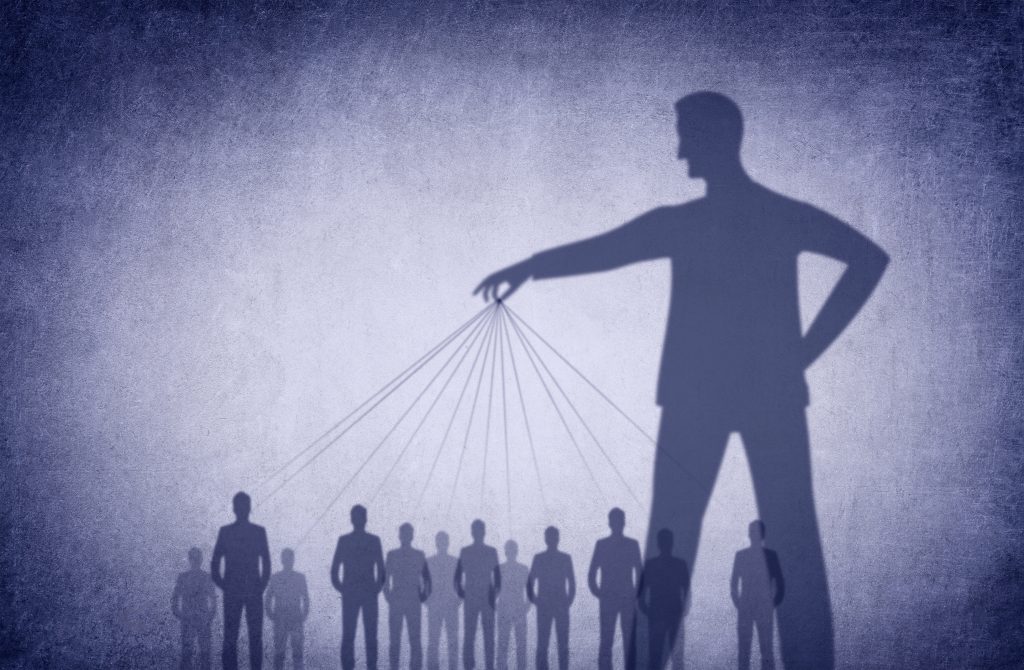
Under the prior Biden Administration, questionable NGOs thrived.
Federal tax dollars were funneled (some say “laundered”) to the NGOs, to pay for a wide range of unethical and even illegal activities to harm and undermine American taxpayer interests.
Notably, the uber-left-wing, pro-Biden / Harris, partisan PRSA has had nothing to say in recent months or years about Crowds on Demand or the growing industrialization of rent-a-mobs.
It would seem that if PRSA / BEPS actually cared about ethics, they would be leading the fight against veiled front groups involved in public deception.
Some 20 years ago, PRSA did seem to care, with BEPS issuing a public advisory warning against these practices.
As outlined, the unethical political-comms practice known as “astroturfing” seeks to deceive the public and the media, by making it appear there is widespread, purely organic protest to a political party, an elected figure, or a public issue, by paying people essentially off the street to show up with torches and pitchforks … er, I mean, picketing, placards and raised fists.
In the face of more recent publicized and wildly unethical rent-a-mob activity, however, PRSA has remained stone-silent.
No admonishments.
No social media posts to remind the PR industry about ethical versus unethical forms of political protest.
No provisions of prior BEPS advisories that outline undisclosed front groups and astroturfing as patently unethical.
It’s as though PRSA wants these toxic, misleading, and divisive tactics to continue, unabated.
Fake protests have been going on for decades of the modern era — and they’ve become increasingly sophisticated in their degrees of duplicity.
Partisan political groups often stage these fake-protest scenes themselves through their in-house hacks, who aren’t even “PR” people… just charlatans.
This issue became a much bigger problem when large, brand-name PR firms — supposedly with good credentials as upstanding members of the business community — started staging these displays themselves, as fee-for-service.
Anecdotally, I once heard about a PR firm in my local area (Knoxville, Tennessee) that — several decades ago — was well-known to run around to senior-care retirement homes and pick up 20-30 elderly residents on a bus, under the false pretenses of providing a free “field trip.”
The PR firm’s paid bus service would then transport the seniors — unbeknownst to these residents in advance and without their knowledge or permission — to “concerned citizen” events, at the behest of the PR firm’s client. The client and their PR firm wanted to convince the news media (which also were called to the scene at the appointed time by the same PR firm, of course) that a bunch of senior citizens were being “victimized” by a competitor. The PR firm provided free (billed to their client) lunches and snacks to the unsuspecting and exploited seniors, who were made to sit through an hour-long “educational program” in the community (i.e. the “protest” event). Later that evening, on the local TV newscast, the camera would pan to seats filled with “angry seniors,” who, in fact, weren’t “angry” at all and had no idea what was going on. These poor folks had simply boarded the bus that morning because they were promised a free lunch and a day pass out of the care facility.
Ugly, icky stuff!
Whatever the smoke-and-mirrors scenario, this brand of “PR” deception only appears to be escalating in modern society, not decreasing.
Which begs the question of PRSA and its Board of Ethics and Professional Standards: Why the “looking the other way” routine?
Ironically, PRSA’s BEPS issued a robust “professional standards advisory” 15 years ago, calling out “looking the other way” as unethical in and of itself. (You can no longer find this advisory on PRSA’s BEPS links either under “advisories” or under “position papers” on BEPS’s site… Hmmm — wonder why?! Could it be because a vast array of misbehavior detailed in this advisory now rings too close to home for PRSA leadership?)





As mentioned, PRSA has aligned itself as fervently and steadfastly pro-Democrat / anti-Trump.
While everyone has a right to their own political viewpoints, the trouble with these folks is that they’ve sloppily crossed the streams between their personal preferences and what should have remained PRSA’s nonpartisan / apolitical brand voice.
Instead, you need only peruse a thin sliver of the online record of past PRSA National Chairs like Del Galloway (also a recent-past PRSA appointee to and President of the ACEJMC academic accreditor), Jane Dvorak, and Michelle Olson, to get the gist of PRSA’s worshipful devotion to the partisan political left:

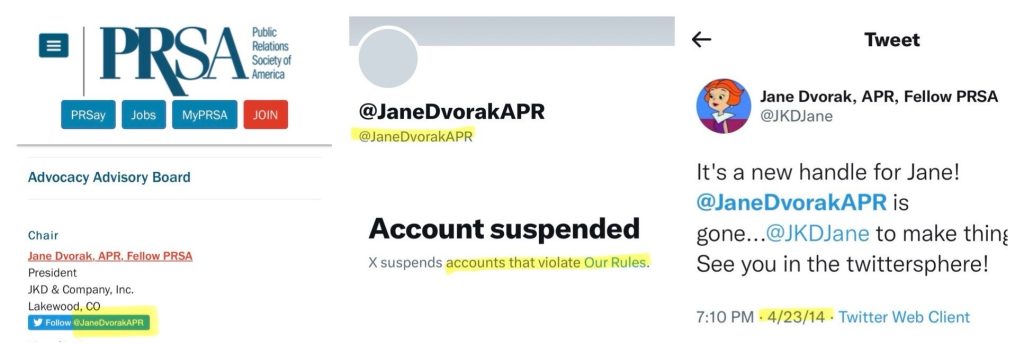
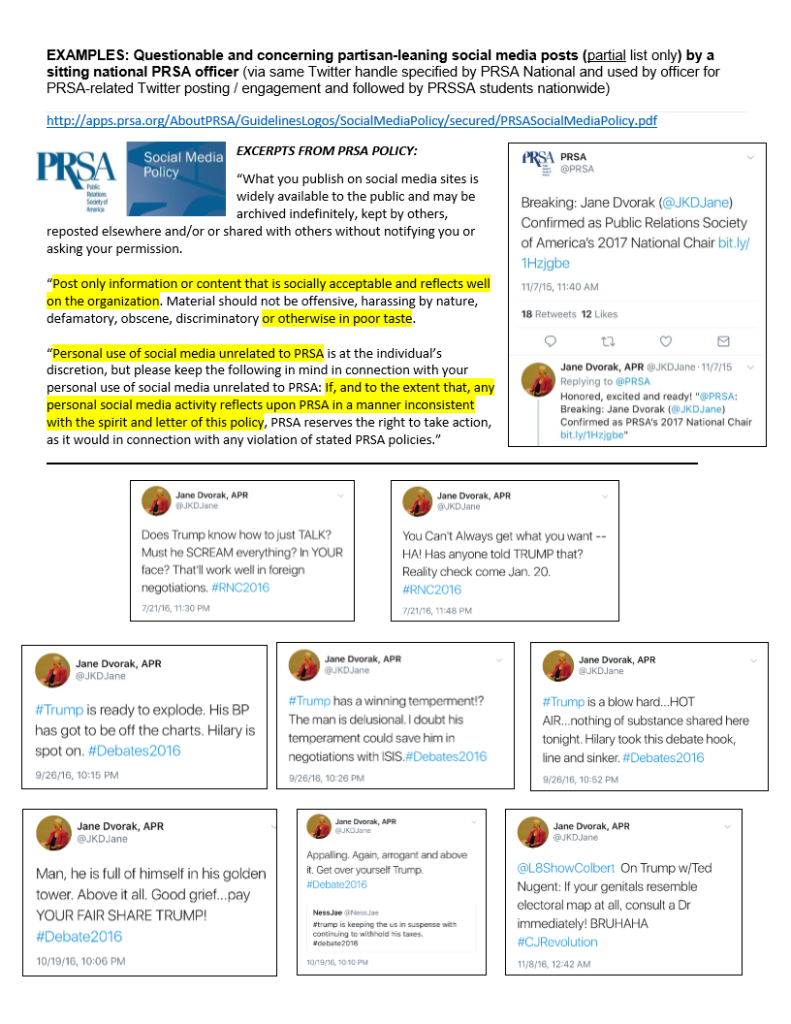
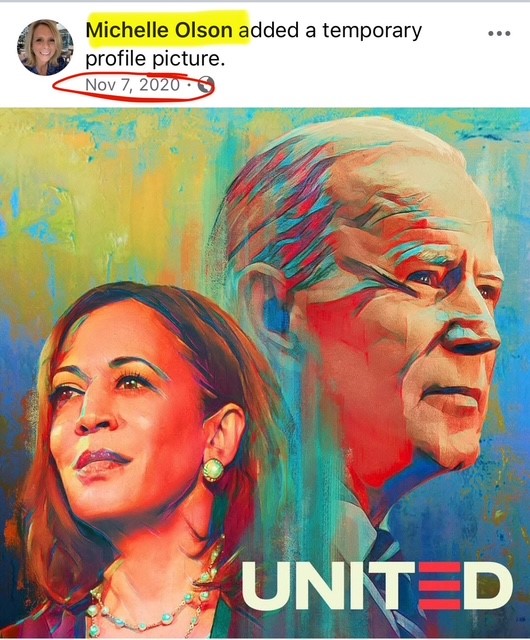
Just this year, in February 2025, current PRSA Chair Ray Day announced that PRSA is “doubling down on DEI,” in a public rebuke of President Trump’s January 2025 Executive Order…
…and, a thumbing-of-nose to DOJ and other federal mandates that government-employed PRSA members are nonetheless obligated to observe.
This partisan-heavy undermining of PRSA’s ethics code and advocacy voice will continue unabated — no doubt.
PRSA’s BEPS Chair has — for some years now — been Mark Dvorak, a long-time chum of these PRSA leaders himself:
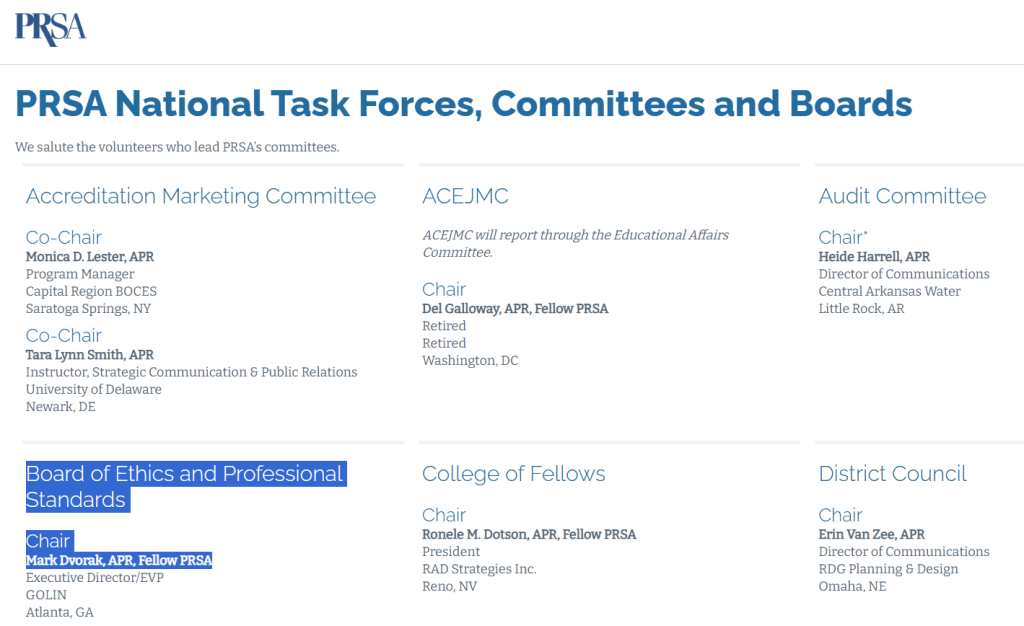

Ironically, Mr. Dvorak (with whom I’m unsure if Jane Dvorak is related or not) opines on his X handle that he is an “Advocate for making hypocrisy a felony.”
Yet Mr. Dvorak chairs PRSA’s Ethics Board that calls for “disclosure” and “free flow of information” by everyone in the PR industry while he himself “protects” his posts from anyone being able to see them:

“#StopTheCrayCray“?!
If only Mr. Dvorak would!
The PR industry needs stronger, more plentiful and certainly more credible voices calling out partisan front groups (among other PR abominations).
Trouble is, PRSA itself has emerged as a partisan front group, by definition and full-on dysfunctionality. Which makes advocating against front groups… Ohhhh… I don’t know — AWKWARD.
We also need industry voices calling out the exceptionally unethical rent-a-mob practices monetized by Crowds on Demand as well as other outfits that have been more low-profile about their sleights of hand.
On that point, PRSA fails yet again, by failing to show up. Their AWOL status is clearly yet another choice made by leadership to abdicate any leadership role.
PRSA has made it abundantly clear that — armed with a 25-year-old ethics code that BEPS hasn’t updated since the era of the fax machine — it has precisely zero interest in serving as any such voice.
True to form, PRSA has been failing our industry in public relations — and society at-large — for many years. We deserve better.
Mary Beth West is a PR strategist and co-founder of the #PRethics Community on LinkedIn.
